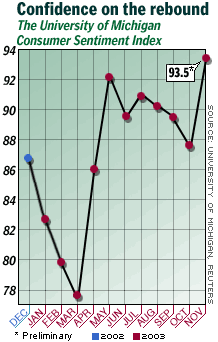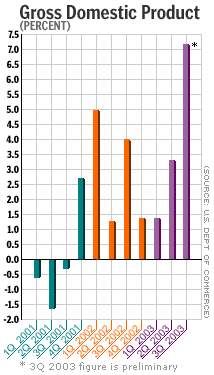NEW YORK (CNN/Money) -
Friday's flood of economic data painted a broad picture of an economy easing up after the third quarter's best-in-two-decades sprint, but not about to stop running any time soon.
In October, the first month of the fourth quarter, retail sales and industrial production came in slightly worse than Wall Street had been expecting.

But the Labor Department's report on October producer prices, and the University of Michigan's early November consumer sentiment index, as reported by Reuters, were much stronger than expected.
"We're pulling back from a third quarter that was an aberration, with growth well above trend level," said Lehman Brothers senior economist Drew Matus. "Does this mean we will collapse? The answer is 'No.'"
The weekly leading economic index of the Economic Cycle Research Institute, a private research firm in New York, fell in the latest week and has been mostly stagnant, with a slight downward trend, since peaking in August.
The economy grew at a 7.2 percent annual rate in the third quarter, according to the Commerce Department, the fastest pace since the first quarter of 1984 -- and that number could get revised upward, to as much as 7.8 percent, Matus said.
But such growth rates are unsustainable in the long run, and most economists expect a cooler rate of about 4 percent or less in the fourth quarter -- which is still "pretty terrific," in the words of Anthony Chan, chief economist at Banc One Investment Advisors.
Consumers slow down
Consumer spending, driven by child tax-credit checks and cash from mortgage refinancing to an extreme annual growth rate of 6.6 percent in the third quarter, is almost certain to cool off in the fourth quarter as the refi boom and the tax-rebate effects recede, and October's retail sales report reinforced expectations of such a decline.
"The data suggest real consumers' spending rose marginally last month -- but we still expect only a 1.5 percent annualized increase in the fourth quarter," said Ian Shepherdson, chief U.S. economist at High Frequency Economics Ltd.

Nevertheless, a big drop in auto sales contributed to the October numbers. Ex-autos, sales were up 0.2 percent, the sixth straight monthly increase, and year-over-year retail sales were still up a very healthy 6.2 percent.
And economists expect consumers to get another boost in the first half of 2004, when many taxpayers will get bigger-than-expected income tax refund checks. The tax cuts for 2003 were retroactive to Jan. 1, but withholding was only changed for half the year, and next year's refund checks will reflect the full year's worth of lower tax rates.
The big question for the immediate future is how well consumers will spend in the meantime, during the critical holiday shopping season. Though warnings Thursday from retailers Wal-Mart (WMT: Research, Estimates), Target (TGT: Research, Estimates) and Tiffany (TIF: Research, Estimates) raised some caution flags about the strength of holiday sales, the stronger-than-expected Michigan sentiment index buoyed economists' hopes.
"With the tide turning on job growth, consumer sentiment going into the holidays is far better than last year, even if it's not quite happy days are here again," said Bill Cheney, chief economist at John Hancock Financial Services in Boston.
Waiting for production
Possibly the most worrisome of Friday's news was the Fed's industrial production report, which conflicted with the picture of a stronger manufacturing rebound suggested by the Institute for Supply Management's October survey of manufacturing activity.
Many economists hoped a third-quarter decline in inventories would force businesses to re-stock their shelves in the fourth quarter, pushing industrial output -- and the broader economy -- higher.
But that hasn't happened yet. It's possible that new inventory management technology and lingering business caution mean warehouse shelves aren't being filled yet -- though that can't last forever, many economists say.
"Firms are still pretty cautious, given the experience of the past couple of years," said former Fed economist Wayne Ayers, now chief economist with Fleet Boston Financial. "But if firms are going to maintain market share, they will have to be competitive in terms of the goods they offer," meaning they may have to start gathering a stockpile of goods soon.
Fed still on hold
Another worrisome number Friday -- if you just focused on the headline -- was the October PPI, which at first blush might seem to raise the prospect of inflation and a sooner-than-expected campaign by the Fed to raise their key short-term interest rate from a 41-year low.
But many economists dismissed the report, noting that it was mostly driven by a huge gain in auto prices. In any event, producer prices have risen for several months, without yet making a dent in consumer prices, which are more important to the Fed.
Several Fed officials in recent days have said that, despite the economic turnaround, they're in no rush to raise rates. They've said the economy needs to run at a fast clip for a sustained period before the labor force and production equipment are in full use. Only then, according to their view, would wage and price pressure be so significant that they'd have to act.
Though some economists disagree with this view, most agreed there was little in Friday's data that would change the Fed's mind.
"Price pressures appear to be building at crude PPI levels, but the Fed will likely wait to respond until these pressures filter into the consumer price index," said UBS Warburg chief economist Maury Harris. "We do not expect that to occur until next year."

|

